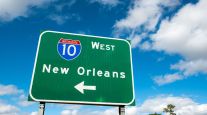ATA’s Card Visits London Insurers, Urges Them to Re-Enter U.S. Trucking Market
This story appears in the July 18 print edition of Transport Topics.
Michael Card, second vice chairman of American Trucking Associations, urged insurance underwriters in London last week to re-enter the U.S. trucking market.
Card, president of Combined Transport Inc., Central Point, Ore., told Transport Topics he touted the significant improvements the U.S. trucking industry has made over the past decade during a July 12 address to Lloyd’s of London.
He said he pointed out that fatal accidents involving trucks in the United States have plummeted 33% since 2003 and injuries from truck-involved accident injuries have dropped 30%.
However, despite those dramatic declines, motor carriers are generally not receiving offers for discounts on coverage, Card said.
“Insurers rate us on what has happened — not what will happen,” said Card, adding that insurers only want to know “ ‘What are your claims rates in the past?’ ”
Card said he noted during his speech that improved seat-belt usage by truckers has helped reduce fatalities, as has increased use of speed limiters.
He also said more vehicles are employing anti-lock brakes, which further reduces accident rates.
“It’s hard for insurance companies to give you a break, even with a good safety record,” Card told TT. “But if a carrier is aggressive and spends the money needed on safety, he may not get an immediate reduction in his insurance rates. But he will get an immediate reduction in his amount of claims.”
Insurance costs represent 5.2 cents per mile traveled, according to motor carriers who participated in a survey conducted by the American Transportation Research Institute. The total cost of operation per mile in this year’s first quarter was $1.491, so insurance totaled about 3% of costs, ATRI said.
Card said four other safety innovations over the past decade also are improving highway safety — truck and trailer stability control devices, lane-departure systems, collision mitigation technology and side-view mirror monitors, which alert drivers a vehicle is in a lane before they merge.
This is not the first time a U.S. trucking executive has spoken before Lloyd’s of London.
Five years ago, Ray Kuntz, CEO of Watkins & Shepard Trucking Inc. and a former ATA chairman, addressed the group because of growing concern over dwindling insurance options in the United States.
“One of our biggest costs is insurance, and anything we can do to keep the price competitive is good for the industry,” Kuntz told TT earlier this month.
He said trucking has been particularly concerned with the extent of insurance costs that have cost some fleets millions of dollars as a result of a single accident.
In a Michigan case decided in April, the driver of a passenger vehicle was awarded $1.98 million in compensatory damages by a jury.
The driver claimed he had permanent injuries following an April 2008 accident caused by a trucker who admitted he fell asleep behind the wheel.
Although the plaintiff did not see a doctor for five days, he was treated by a specialist for 18 months following the mishap and initially was seeking only $750,000.
Kuntz cited cases like this as a main reason why groups like Lloyd’s of London have left the U.S. market.




